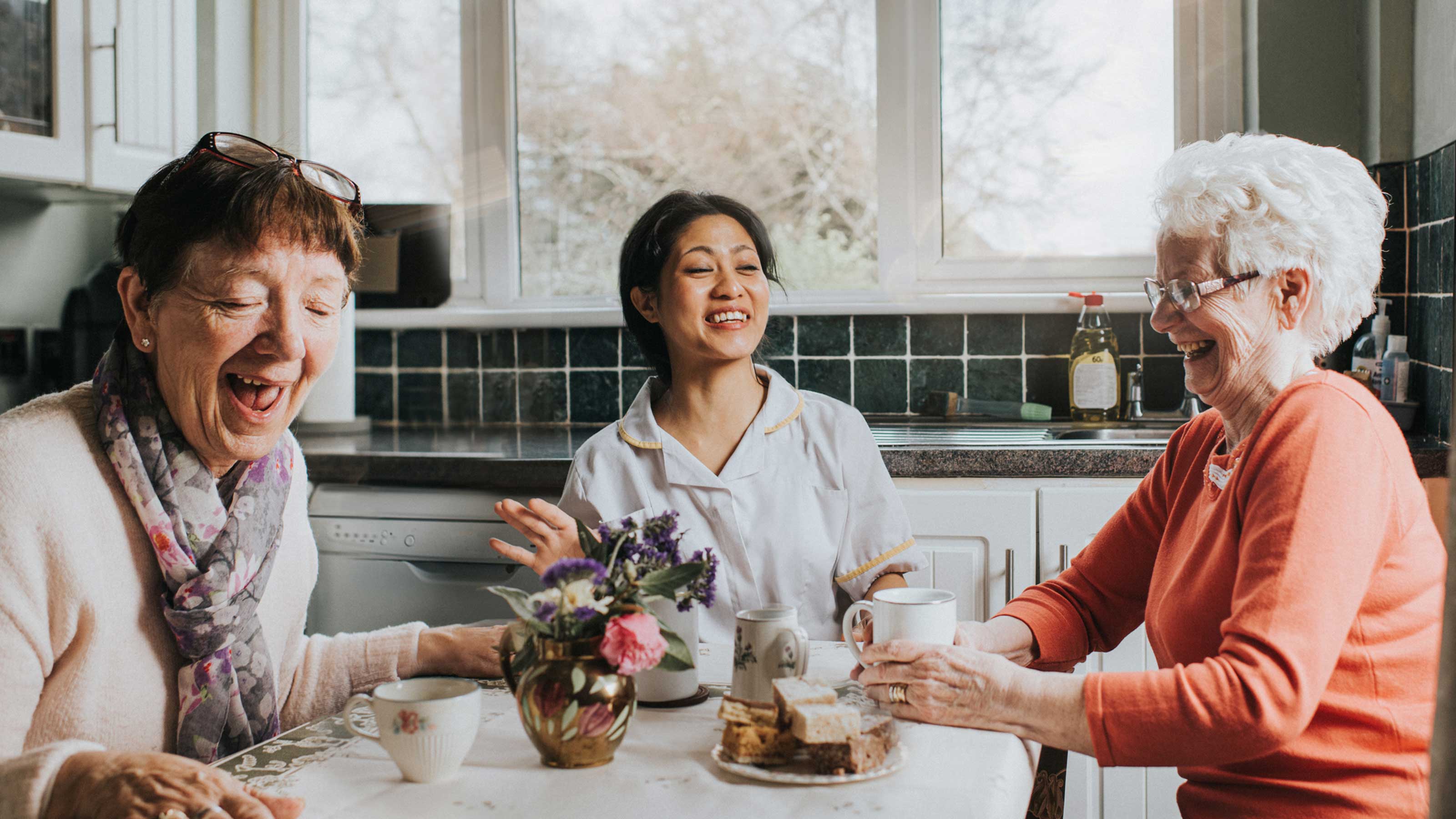From One Widow to Another: Words of Wisdom for Hope and Happiness
Whether you lost your spouse recently or years ago, the grieving and healing process is a journey. Financial adviser Barbara Shapiro shares the most helpful life advice she’s gotten from other widows after the loss of her own husband.


Profit and prosper with the best of Kiplinger's advice on investing, taxes, retirement, personal finance and much more. Delivered daily. Enter your email in the box and click Sign Me Up.
You are now subscribed
Your newsletter sign-up was successful
Want to add more newsletters?

Delivered daily
Kiplinger Today
Profit and prosper with the best of Kiplinger's advice on investing, taxes, retirement, personal finance and much more delivered daily. Smart money moves start here.

Sent five days a week
Kiplinger A Step Ahead
Get practical help to make better financial decisions in your everyday life, from spending to savings on top deals.

Delivered daily
Kiplinger Closing Bell
Get today's biggest financial and investing headlines delivered to your inbox every day the U.S. stock market is open.

Sent twice a week
Kiplinger Adviser Intel
Financial pros across the country share best practices and fresh tactics to preserve and grow your wealth.

Delivered weekly
Kiplinger Tax Tips
Trim your federal and state tax bills with practical tax-planning and tax-cutting strategies.

Sent twice a week
Kiplinger Retirement Tips
Your twice-a-week guide to planning and enjoying a financially secure and richly rewarding retirement

Sent bimonthly.
Kiplinger Adviser Angle
Insights for advisers, wealth managers and other financial professionals.

Sent twice a week
Kiplinger Investing Weekly
Your twice-a-week roundup of promising stocks, funds, companies and industries you should consider, ones you should avoid, and why.

Sent weekly for six weeks
Kiplinger Invest for Retirement
Your step-by-step six-part series on how to invest for retirement, from devising a successful strategy to exactly which investments to choose.
Widows (and widowers) often need help, even years after the death of their spouse. I often share about this from my point of view, as I lost my husband in 2016. However, for this article I wanted to share others’ helpful advice, gathered from my talks with clients, friends and fellow support group members. You do not have to agree with all of it, but hopefully there will be something helpful shared for your own personal situation.
When we grow up, we learn from those who have already experienced things. Our parents, older siblings, teachers and others help shape the people we become, and even how we survive trying times. For me, other widows who had lost their husbands usually had the best advice, as they had gone through some version of the struggles I was going through.
For those who have lost a spouse, or others who might, I hope they find the following insights helpful:
From just $107.88 $24.99 for Kiplinger Personal Finance
Become a smarter, better informed investor. Subscribe from just $107.88 $24.99, plus get up to 4 Special Issues

Sign up for Kiplinger’s Free Newsletters
Profit and prosper with the best of expert advice on investing, taxes, retirement, personal finance and more - straight to your e-mail.
Profit and prosper with the best of expert advice - straight to your e-mail.
“You will feel a sense of emptiness, but it gets better.” To love is what makes us human. To feel like you have lost your love is a devasting feeling. It will be overwhelming at times. Although it is an emotional pain, it can feel like you are physically suffering from your loss. That is normal. Although you might not be ready to hear it, know that the pain does eventually subside.
“Don’t tuck in your emotions.” Bottling in all your sadness is not a healthy thing to do. Letting it out is a needed process to eventually heal.
“Find a shoulder to cry on.” It can make such a difference to have a good listener to talk with. Maybe that is a friend, family member or grief counselor. Many have found it helpful to have someone you can dump your grief on, especially in the early stages.
“Everyone wants to relate.” Many people might say, “I can imagine what you are going through.” Resist the urge to get mad at them, because only you know what you are going through. It is especially easy to get aggravated at those who still have a significant other in their lives. Most of these people have good intentions and are just trying to relate with your situation the best that they can.
“It is OK to kick people out.” In the early stage, all the support, as wonderful as it is, can feel like it is too much. There are times when you might want to just be alone. When that happens, it is all right to nicely ask for time on your own.
“The people around you get back to their lives.” At first a widow might feel an amazing level of support, but over time that support wains. It is normal, so do not read into it that people do not care about you anymore.
“Hold off on making big decisions.” When we lose a loved one, our emotional brain usually takes over. The risk of making decisions in this stage is that rational thoughts might not be considered. Big mistakes might be made, so take time thinking things through. Get help from a professional (like a financial planner) or at least a loved one.
“Get your house in order.” Finances can feel complicated, especially if managing bills, budgets and investments was your spouse’s responsibility. Work with a trusted adviser to educate you and help you make the right decisions. Good advisers might even help you go through the mail to understand things that feel too complicated to process. Having someone to help will alleviate some of the stress that financial matters can cause.
“Stay social.” It is OK to not rush into a new relationship, but resist the common feeling to want to just hide out in your home all alone. We need human interaction. Even those who are introverted need to interact with others. Find a way to get out of your home.
“Exercise regularly.” A simple thing like going for a walk can allow you to process your thoughts. If you are feeling any frustrations, regrets and even anger, working out can help burn off those emotions. Additionally, endorphins are chemicals produced by our bodies while exercising that help to relieve stress and pain. Have a good jacket for the rainy/snowy days, as those gloomy days are ones you might need the exercise more than on the sunny days.
“Don’t let yourself go.” Avoid gaining a lot of weight, as you will not feel good about yourself. Plus, it can cause health issues. It is true that you never know when you might meet someone new, so stay fit if you can. Avoid the other extreme of not eating at all. For some they lose their appetite. If that is the case, make sure to eat at least smaller meals to make sure you have energy to get through the day.
“Don’t fall into the bottle.” There are too many stories of people relying on alcohol and drugs to get through a sad situation. Yes, it might numb the pain in the short term, but in the long run it makes everything worse. It can cause health issues; it can cause the loss of friends; it can lead to the loss of a job and so on. If people seem to force drinks on you, simply reply, “If it is OK, I’d prefer to just have a water.”
“Don’t be afraid to cry.” At first it is common to cry multiple times a day. Even when you think you’re past that stage, there will be times when you will get overcome by emotions and will not be able to hold back the tears. Most “firsts” are especially sad, such as the first anniversary, birthday and holidays. Many things might trigger sad emotions. Even a song can hit you when you least expect it over 10 years later. When the sadness hits, go ahead and cry. It is OK.
“Keep pushing forward.” While it is OK to cry, avoid falling into a permeant state of despair. You need to try staying positive. It is common to feel guilty for feeling happy, but most deceased spouses would want those they left behind to be happy. There is a lot of truth in the old saying, “Time heals all wounds.” Go at your own pace.
“Remember there is a world around you.” It is so common to believe we are the center of the universe, that our problems are the worst, but that is likely not true. There are likely others suffering in different ways worse than us. If you can, try to help those others in need. It can give you a sense of purpose. If you received help during this difficult time, pay it forward, whenever you can.
“Choose happiness over sadness.” We all need a period of grieving the loss of a spouse. However, just because one chapter of your life ends in a way you didn’t want, it does not mean your entire story has to be ruined. If you need to fake it for a while, that is OK. Try to get out, dress up and find reasons to smile.
“Look for the good in everything.” It might seem impossible at times to see the good in bad situations. However, appreciate things like friends, acts of kindness, nice days, beautiful landscapes and more. Being able to see the good in the world can make a huge difference in your ability to be grateful, which is a key to increased happiness.
“You’re not replacing the person.” If you do find a new significant other, try not to feel guilty. The spouse who died is gone. That person cannot be brought back. Those who die are not physically here. For some, as soon as a new person comes into their lives, that is the day they stop constantly crying. Stay positive. There are other people in the world. You never know what might happen.
“There is no timeline.” When it comes to something like dating, some are ready sooner than others. Some are never ready. It is your choice. Do not let other people make it for you.
“Avoid widow’s remorse.” It is OK to focus on positive memories of a lost spouse, as long as you remember that no one person is perfect. If you rewrite history and make your spouse flawless, it will make everyone else with imperfections seems unworthy to spend time with.
“Consider a support group.” To share emotions with others can make a huge difference. Those who join the group are there to get help, but they are also there to offer help.
“Read helpful books.” There are tons of books that get into specific types of grief and how to overcome it. Buy one and put in next to your nightstand. Digest it at your own pace.
“Like it or not, you must find acceptance.” You have to make peace with the fact that you are now on a different path. Your vision for your future has changed and you cannot do anything about that. You have to set a new course. Just do not forget, your life can still be wonderful.
“Trust in God.” Praying is so powerful. Knowing God is always at your side is an amazing feeling. Trust that there is a plan for you, even when you feel like you do not have one.
Securities and Advisory Services offered through Cadaret, Grant & Co., Inc., a Registered Investment Adviser and Member FINRA/SIPC. HMS Financial Group and Cadaret, Grant & Co., Inc. are separate entities.
Profit and prosper with the best of Kiplinger's advice on investing, taxes, retirement, personal finance and much more. Delivered daily. Enter your email in the box and click Sign Me Up.

Barbara Shapiro is the President of HMS Financial Group located in Dedham, Mass. She is a CFP®, Certified Divorce Financial Analyst and a Financial Transitionist®. She is also co-author of "He Said: She Said: A Practical Guide to Finance and Money During Divorce." Her firm specializes in comprehensive financial planning with a subspecialty in divorce that assists clients' transition from marriage to independence with peace of mind and confidence. Learn more at HMS-Financial.com.
-
 Quiz: Do You Know How to Avoid the "Medigap Trap?"
Quiz: Do You Know How to Avoid the "Medigap Trap?"Quiz Test your basic knowledge of the "Medigap Trap" in our quick quiz.
-
 5 Top Tax-Efficient Mutual Funds for Smarter Investing
5 Top Tax-Efficient Mutual Funds for Smarter InvestingMutual funds are many things, but "tax-friendly" usually isn't one of them. These are the exceptions.
-
 AI Sparks Existential Crisis for Software Stocks
AI Sparks Existential Crisis for Software StocksThe Kiplinger Letter Fears that SaaS subscription software could be rendered obsolete by artificial intelligence make investors jittery.
-
 Social Security Break-Even Math Is Helpful, But Don't Let It Dictate When You'll File
Social Security Break-Even Math Is Helpful, But Don't Let It Dictate When You'll FileYour Social Security break-even age tells you how long you'd need to live for delaying to pay off, but shouldn't be the sole basis for deciding when to claim.
-
 I'm an Opportunity Zone Pro: This Is How to Deliver Roth-Like Tax-Free Growth (Without Contribution Limits)
I'm an Opportunity Zone Pro: This Is How to Deliver Roth-Like Tax-Free Growth (Without Contribution Limits)Investors who combine Roth IRAs, the gold standard of tax-free savings, with qualified opportunity funds could enjoy decades of tax-free growth.
-
 One of the Most Powerful Wealth-Building Moves a Woman Can Make: A Midcareer Pivot
One of the Most Powerful Wealth-Building Moves a Woman Can Make: A Midcareer PivotIf it feels like you can't sustain what you're doing for the next 20 years, it's time for an honest look at what's draining you and what energizes you.
-
 I'm a Wealth Adviser Obsessed With Mahjong: Here Are 8 Ways It Can Teach Us How to Manage Our Money
I'm a Wealth Adviser Obsessed With Mahjong: Here Are 8 Ways It Can Teach Us How to Manage Our MoneyThis increasingly popular Chinese game can teach us not only how to help manage our money but also how important it is to connect with other people.
-
 Looking for a Financial Book That Won't Put Your Young Adult to Sleep? This One Makes 'Cents'
Looking for a Financial Book That Won't Put Your Young Adult to Sleep? This One Makes 'Cents'"Wealth Your Way" by Cosmo DeStefano offers a highly accessible guide for young adults and their parents on building wealth through simple, consistent habits.
-
 Global Uncertainty Has Investors Running Scared: This Is How Advisers Can Reassure Them
Global Uncertainty Has Investors Running Scared: This Is How Advisers Can Reassure ThemHow can advisers reassure clients nervous about their plans in an increasingly complex and rapidly changing world? This conversational framework provides the key.
-
 I'm a Real Estate Investing Pro: This Is How to Use 1031 Exchanges to Scale Up Your Real Estate Empire
I'm a Real Estate Investing Pro: This Is How to Use 1031 Exchanges to Scale Up Your Real Estate EmpireSmall rental properties can be excellent investments, but you can use 1031 exchanges to transition to commercial real estate for bigger wealth-building.
-
 The 8 Stages of Retirement: An Expert Guide to Confidence, Flexibility and Fulfillment, From a Financial Planner
The 8 Stages of Retirement: An Expert Guide to Confidence, Flexibility and Fulfillment, From a Financial PlannerRetirement planning is less about hitting a "magic number" and more about an intentional journey — from understanding your relationship with money to preparing for your final legacy.